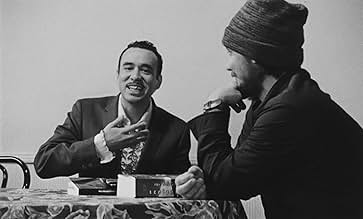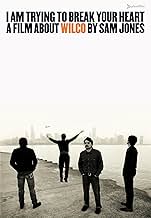IMDb-BEWERTUNG
7,4/10
2257
IHRE BEWERTUNG
Füge eine Handlung in deiner Sprache hinzuFirst-time filmmaker and award-winning photographer Sam Jones documents the recording of Wilco's album, "Yankee Hotel Foxtrot."First-time filmmaker and award-winning photographer Sam Jones documents the recording of Wilco's album, "Yankee Hotel Foxtrot."First-time filmmaker and award-winning photographer Sam Jones documents the recording of Wilco's album, "Yankee Hotel Foxtrot."
Empfohlene Bewertungen
Walking into this movie I had no working knowledge of Wilco other than the fact that their latest album, "Yankee Hotel Foxtrot", had received a fair degree of press. Completely untainted by prior convictions I found this movie to be the most fascinating document of artistic creativity and tension ever committed to film. Not only is the music great, but the story surrounding the making of the album is captivating.
firstly i'm a huge wilco fan and therefore was always going to like this, even if it was directed by michael bay and shot on a ninety eighties camcorder. It has fantastic footage that allows you to get into the 'wilco world' and generally made me very jealous.
however i don't believe sam jones has any clout as a film maker. The biggest flaw seems to be that it doesn't get what yankee hotel foxtrot really is as an album. Even in the commentary Jeff Tweedy shows his surprise at jones' inclusion of live versions of songs from earlier albums like 'being there'.
The big problem is that the album clearly changed a great deal after mr bennett left the band and jim o rourke turned a collection of good and slightly less than good rock songs into a ground-breaking piece of rock and roll. O rourke made the album great, hearing the versions that were painstakingly put together before Jim came on board proves this and yet Jones failed to make him a central part of the doc, relagated him to one joint interview with Jeff Tweedy when he says nothing.
Unfortunately this film only tells half the story and therefore feels half-finished and padded out with lots of material that could have been put on the, already very healthy, special features discs. Having said all this it is still worth watching but not worth worshipping, a bit like yankee hotel foxtrot (unless you're listening to it on vinyl of course!).
however i don't believe sam jones has any clout as a film maker. The biggest flaw seems to be that it doesn't get what yankee hotel foxtrot really is as an album. Even in the commentary Jeff Tweedy shows his surprise at jones' inclusion of live versions of songs from earlier albums like 'being there'.
The big problem is that the album clearly changed a great deal after mr bennett left the band and jim o rourke turned a collection of good and slightly less than good rock songs into a ground-breaking piece of rock and roll. O rourke made the album great, hearing the versions that were painstakingly put together before Jim came on board proves this and yet Jones failed to make him a central part of the doc, relagated him to one joint interview with Jeff Tweedy when he says nothing.
Unfortunately this film only tells half the story and therefore feels half-finished and padded out with lots of material that could have been put on the, already very healthy, special features discs. Having said all this it is still worth watching but not worth worshipping, a bit like yankee hotel foxtrot (unless you're listening to it on vinyl of course!).
This is a documentary about the roots-rock band Wilco and the trials and tribulations they suffered in the production of their 2002 CD `Yankee Hotel Foxtrot.' Initially given a good deal of support by their record label (Reprise) Wilco strayed from their previous country folk-rock sound to embrace more experimental studio techniques and used synthesizers and strings to flesh out their sound. Their suits at Reprise balked at this sea-change and eventually refused to release the record and booted the band from the label. While all of this is going on the band is suffering internal strife as one of the members is let go with acrimony.
The story of Wilco's last album has become legendary in the music world and this documentary, shot in grainy black and white tells the story and portrays the band and its leader Jeff Tweedy in a sympathetic light. Tweedy is shown as the disheveled genius musician pushing the art forward while the greedy evil corporate executives attempt to thwart him. It's nice to see the band triumph in the end, and the film does throw some light on the pressure that is undergone to make a record for a major label as well as showing some of the seedier sides of the music business as flaks on both sides beat their chest and trumpet their side of the story. (Rating: 7 out of 10)
The story of Wilco's last album has become legendary in the music world and this documentary, shot in grainy black and white tells the story and portrays the band and its leader Jeff Tweedy in a sympathetic light. Tweedy is shown as the disheveled genius musician pushing the art forward while the greedy evil corporate executives attempt to thwart him. It's nice to see the band triumph in the end, and the film does throw some light on the pressure that is undergone to make a record for a major label as well as showing some of the seedier sides of the music business as flaks on both sides beat their chest and trumpet their side of the story. (Rating: 7 out of 10)
This picture is a must see for any Wilco fan, and I highly recommend seeing it on the big screen if possible. Besides the great concert and 'in process' recording footage, it has great art direction and cinematography. If you're a fan, you already know the stroy; Band makes record, band gets rejected by label, bands fires member, band tours, band gets label, critics love band. Interesting behind the scenes stuff that doesn't make you want to ralph like watching that stupid VH-1 show.
This documentary comes as a nice surprise to anyone who has been following the Uncle Tupelo/Sun Volt/Wilco chapter of rock n' roll history being quietly written in the Midwest for the past 15 years. For anyone who is a fan, the film is a must-see. For general fans of rock n' roll it offers a handy introduction to one of the few interesting rock bands in this parched musical era. Judged solely as a documentary film it is a half-hearted effort that scores some points but ultimately doesn't carry its own weight.
First the good: the cinematography, a grainy black and white that is probably 16mm film, is often breathtaking...even magical. In some scenes we can't really tell if that is Chicago snow falling, or simply the film stock being blown out, but the dreamy, low-tech look perfectly complements the musical style and tradition of Jeff Tweedy's aching folk-pop music. The sound recording is also excellent; while not offering the huge sonic experience of, say, the re-released Dolby 5.1 version of the Last Waltz, the sound crew of I Am Trying to Break Your Heart did a wonderful job of capturing the raw, pulsing sounds of a band at work, both in the recording studio and on the stages of nightclubs. Finally the filmmakers do a real service to music fans by including generous amounts of footage of the band at work in the studio writing, rehearsing, recording and mixing songs. It's exciting to see an album taking shape before your eyes in this manner.
Despite these strengths the documentary as storytelling gets lost when it drifts away from the recording studio and into the politics of the music business. One thing you can usually count on with documentary filmmaking is that the good guys and the bad guys are allowed to fully reveal themselves in all their naked glory or shameless depravity before our very eyes, but this movie seems to have its moral compass all screwed up. Or, perhaps it would be more accurate to say: it doesn't have a moral compass but rather buys too easily into the idea that everyone associated with Wilco is a "good guy", and everyone else is villainous.
In fact the band's manager, Tony Margherita, who is marginally awarded the role of narrator of the story, comes off as the kind of shameless huckster who makes the music business such an embarrassing behind-the-scenes spectacle. Early in the film he crows the music biz mantra of "taking Wilco to the next level" with such a moronic, repetitive gusto that one wants to stuff a tambourine in his mouth. When Reprise Records rejects the new Wilco album (ironically because they *don't* think it will take the band to the next level) he changes gears and starts talking about artistic integrity. But when Reprise drops the band from its roster he leads the band into a lucrative contract with... Reprise's sister label, Nonesuch, presumably because they offered the most money.
This should be funny, revelatory stuff, but the filmmakers seem so enamored with the band that they are unable to identify the crassness of this whole story arc, and in fact end the film with the schmoozy manager chortling about how he got Warner Brothers (parent company of Reprise and Nonesuch) to buy the same album twice. Ironic, yes, but the decision to stay in the Warner Bros. family while adopting a tone of moral superiority to their enterprise is nothing but hypocrisy.
Worse, when Tweedy kicks Jay Bennett out of the band midway through filming, the movie essentially takes a brief interlude to mock the departed songwriter. While Mr. Bennett indeed turns in an appalling interview after the incident ("there are some real power issues within Wilco" he puffs like some politically correct academic), the film isn't content to let him make a fool of himself, but rather goes to each member of the band and invites them to insult their departed bandmate on screen. When manager Margherita smugly asserts that Bennett had worn out his welcome with Wilco your skin crawls: it's like Fredo has been sent out on the boat at the end of The Godfather, Part 2 to meet his untimely fate.
The filmmakers all in all seem a wholly unreliable judge of character. Rolling Stone editor David Fricke is treated as an oracle of wisdom, but comes off as the kind of phony that rock n' roll used to be about mocking, not worshipping. I watch this parade of inauthentic politicians rolling across the screen and remember the iconoclastic fire of Bob Dylan in "Don't Look Back", and it's hard to feel anything except depressed by the state of American music in 2002.
All in all this is a movie to see if you love rock music, both because Wilco *matters*, and because it is a grim portrait of the rot at the heart of the American music industry: a rot that isn't just in the office towers of the record labels, as this movie would have you believe, but is much, much closer to home, where the damage it does is more subtle, but more irreparable. Maybe it isn't Warner Brothers fault. Maybe Wilco should heed the words: Doctor, heal thyself.
First the good: the cinematography, a grainy black and white that is probably 16mm film, is often breathtaking...even magical. In some scenes we can't really tell if that is Chicago snow falling, or simply the film stock being blown out, but the dreamy, low-tech look perfectly complements the musical style and tradition of Jeff Tweedy's aching folk-pop music. The sound recording is also excellent; while not offering the huge sonic experience of, say, the re-released Dolby 5.1 version of the Last Waltz, the sound crew of I Am Trying to Break Your Heart did a wonderful job of capturing the raw, pulsing sounds of a band at work, both in the recording studio and on the stages of nightclubs. Finally the filmmakers do a real service to music fans by including generous amounts of footage of the band at work in the studio writing, rehearsing, recording and mixing songs. It's exciting to see an album taking shape before your eyes in this manner.
Despite these strengths the documentary as storytelling gets lost when it drifts away from the recording studio and into the politics of the music business. One thing you can usually count on with documentary filmmaking is that the good guys and the bad guys are allowed to fully reveal themselves in all their naked glory or shameless depravity before our very eyes, but this movie seems to have its moral compass all screwed up. Or, perhaps it would be more accurate to say: it doesn't have a moral compass but rather buys too easily into the idea that everyone associated with Wilco is a "good guy", and everyone else is villainous.
In fact the band's manager, Tony Margherita, who is marginally awarded the role of narrator of the story, comes off as the kind of shameless huckster who makes the music business such an embarrassing behind-the-scenes spectacle. Early in the film he crows the music biz mantra of "taking Wilco to the next level" with such a moronic, repetitive gusto that one wants to stuff a tambourine in his mouth. When Reprise Records rejects the new Wilco album (ironically because they *don't* think it will take the band to the next level) he changes gears and starts talking about artistic integrity. But when Reprise drops the band from its roster he leads the band into a lucrative contract with... Reprise's sister label, Nonesuch, presumably because they offered the most money.
This should be funny, revelatory stuff, but the filmmakers seem so enamored with the band that they are unable to identify the crassness of this whole story arc, and in fact end the film with the schmoozy manager chortling about how he got Warner Brothers (parent company of Reprise and Nonesuch) to buy the same album twice. Ironic, yes, but the decision to stay in the Warner Bros. family while adopting a tone of moral superiority to their enterprise is nothing but hypocrisy.
Worse, when Tweedy kicks Jay Bennett out of the band midway through filming, the movie essentially takes a brief interlude to mock the departed songwriter. While Mr. Bennett indeed turns in an appalling interview after the incident ("there are some real power issues within Wilco" he puffs like some politically correct academic), the film isn't content to let him make a fool of himself, but rather goes to each member of the band and invites them to insult their departed bandmate on screen. When manager Margherita smugly asserts that Bennett had worn out his welcome with Wilco your skin crawls: it's like Fredo has been sent out on the boat at the end of The Godfather, Part 2 to meet his untimely fate.
The filmmakers all in all seem a wholly unreliable judge of character. Rolling Stone editor David Fricke is treated as an oracle of wisdom, but comes off as the kind of phony that rock n' roll used to be about mocking, not worshipping. I watch this parade of inauthentic politicians rolling across the screen and remember the iconoclastic fire of Bob Dylan in "Don't Look Back", and it's hard to feel anything except depressed by the state of American music in 2002.
All in all this is a movie to see if you love rock music, both because Wilco *matters*, and because it is a grim portrait of the rot at the heart of the American music industry: a rot that isn't just in the office towers of the record labels, as this movie would have you believe, but is much, much closer to home, where the damage it does is more subtle, but more irreparable. Maybe it isn't Warner Brothers fault. Maybe Wilco should heed the words: Doctor, heal thyself.
Wusstest du schon
- WissenswertesAccording to Sam Jones, the members of Wilco never complained or asked for space during filming. At one point, Jones said, "I had the camera next to (John Stirratt), pointing straight at him, and he flubbed his bass line. The song stopped, and (Jay Bennett) yelled out, 'That one was going so great!' I felt terrible, but John, ever the gentleman, claimed that I didn't have anything to do with him messing up. (Yeah right, you try doing your job all day with a virtual stranger pointing a giant camera at you.)"
- VerbindungenReferences Charlie und die Schokoladenfabrik (1971)
Top-Auswahl
Melde dich zum Bewerten an und greife auf die Watchlist für personalisierte Empfehlungen zu.
- How long is I Am Trying to Break Your Heart?Powered by Alexa
Details
Box Office
- Bruttoertrag in den USA und Kanada
- 445.522 $
- Eröffnungswochenende in den USA und in Kanada
- 10.776 $
- 28. Juli 2002
- Weltweiter Bruttoertrag
- 445.522 $
- Laufzeit
- 1 Std. 32 Min.(92 min)
- Farbe
- Sound-Mix
- Seitenverhältnis
- 1.85 : 1
Zu dieser Seite beitragen
Bearbeitung vorschlagen oder fehlenden Inhalt hinzufügen























